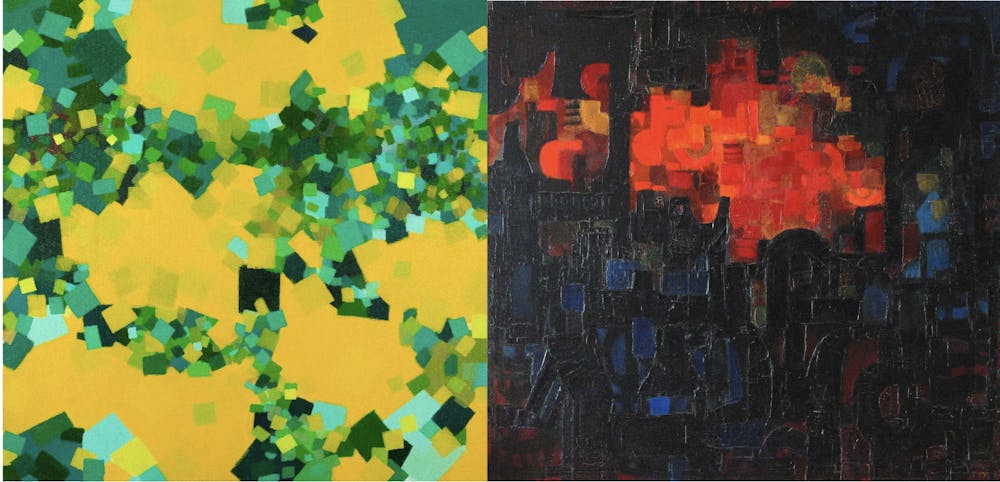IU cancelled Palestinian abstract painter Samia Halaby’s exhibition, which had been planned for three years, according to a two-sentence letter to the artist Dec. 20. After unsuccessful appeals to the IU administration, Madison Gordon, Halaby’s grandniece who works with Halaby’s studio, started a petition urging the university to reinstate the exhibition, which has garnered 9,360 signatures as of Friday evening.
The cancelled exhibition, titled “Samia Halaby: Centers of Energy,” was scheduled to open Feb. 10 and run until June.
Halaby, an IU alumna, was displaced from Palestine, now Israel, with her family during the Nabka — the Arabic word for “catastrophe” which describes to the mass displacement of Palestinians during the 1948 Arab-Israeli war. She graduated from IU in 1963 with a master’s degree in fine arts. She then served as a tenured faculty member at IU from 1969 to 1972 and later became the first female professor at the Yale School of Art in 1972.
“The University community — including students, faculty, staff and alumni as well as the wider Bloomington and Indiana region — have been deprived of an important exhibition of contemporary art and first-rate cultural experience,” the petition reads. “With the show canceled at the eleventh hour, the museum walls will lay bare for more than six months.”
The cancellation comes as IU faces pressure from multiple groups, including U.S. Rep. Jim Banks of Indiana, whose Nov. 15 letter asked IU to crack down on campus antisemitism or face the potential loss of funding.
Notice of the cancellation came only five days after tenured IU professor and Palestine Solidarity Committee faculty advisor Abdulkader Sinno was suspended for allegedly violating procedure while reserving a room for a PSC event.
RelatedIU suspends professor after Palestine Solidarity Committee event. Other faculty denounce the decision Faculty expressed concern that the suspension harms academic freedom and shared governance.
Gordon said Halaby received a call Dec. 20 from David Brenneman, the director of the Sidney and Lois Eskenazi Museum of Art, who mentioned two reasons for the exhibit’s cancellation. One was security and safety concerns. The other was Halaby’s Instagram posts, where she often advocates for Palestinian freedom and a ceasefire in the Israel-Hamas war.
Gordon argued Halaby has always been consistent and public with her advocacy. IU initiated the partnership with Halaby roughly three years ago, Gordon said, when Halaby’s views on Israeli-Palestinian conflict were just as clear.
After the phone call with the director, Halaby received a letter from the director, sent via his secretary, Gordon said.
“As discussed, I write to formally notify you that the Eskenazi Museum of Art will not host its planned exhibition of your work, initially scheduled to begin February 10, 2024,” the letter reads. “The Museum will honor its obligation to return works of art safely to lenders or to forward them on to the Broad Museum of Art at Michigan State University.”
Since then, Gordon and Halaby have sent letters Dec. 27 and Jan. 8 to the museum director and curator, as well as IU President Pamela Whitten and Provost Rahul Shrivastav, asking for the exhibit’s reinstatement. They have received no response.
“At this point, it’s enraging,” Gordon said.
Mark Bode, executive director of media relations at IU, told the IDS the cancellation was due to “concerns about guaranteeing the integrity of the exhibit for its duration.” The Michigan State University Broad Art Museum, which had planned to host a sister exhibition, has said they still plan to hold their show.
Gordon said if security was a concern, then IU should have worked to develop a plan to protect the paintings. She also said she and Halaby had not received details on whether threats were made or how the integrity of the paintings were at risk.
“I am really disappointed in how they’ve handled this situation,” Gordon said. “We have never been treated with this level of disrespect.”
RelatedIU denied its room reservation. The Palestine Solidarity Committee hosted its event anyway Israeli-American activist Miko Peled spoke at a Palestine Solidarity Committee event Thursday evening.
The cancellation has made national news, appearing in the New York Times on Thursday. Despite the coverage, IU has remained silent, Gordon said.
Gordon and Halaby gave IU a deadline of Jan. 12 to change their decision. As of Friday morning, they have not received any word from the university.
“We wanted to reinstate the show to honor the great work of the museum’s team, of the curatorial team who spent the last three years working on this,” Gordon said. “I mean it’s really a shame to be throwing away their hard work.”
If IU does not choose to reinstate the show today, Gordon said her team will find a way to honor the museum’s work.
In a Jan. 11 email to Whitten detailing the petition to reinstate Halaby’s work, Gordon quotes a statement from Halaby that argues the decision has denied IU students the opportunity to engage with different ideas and forms of expression.
“In my view this is more important than what might be considered my loss, one that I think is another small stumbling block along the way,” the statement from Halaby reads. “But the insult to me and to the community at large is substantial.”




